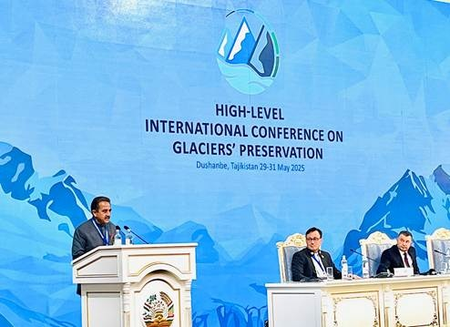New Delhi, May 31 (IANS) Retreat of glaciers represents an immediate risk for billions of people, said Union Minister of State for Environment, Forest and Climate Change (EFCC), Kirti Vardhan Singh, while reaffirming India’s commitment to glacier preservation.
He was speaking at the Plenary Session of the High-Level International Conference on Glaciers’ Preservation, in Dushanbe, Republic of Tajikistan.
“The retreat of glaciers represents not only a warning but an immediate reality with far-reaching implications for water security, biodiversity, and the livelihoods of billions of people,” said Singh.
The Minister underscored that the phenomenon is accelerating, with disproportionate impacts on mountain regions such as the Himalayas.
Addressing the global context, the Minister “reaffirmed India’s commitment to equity and the principle of Common but Differentiated Responsibilities and Respective Capabilities (CBDR–RC) in international climate action”.
He emphasised that while South Asia contributes minimally to global cumulative emissions, it remains highly vulnerable to climate change impacts.
Singh also welcomed the declaration of 2025 as the International Year of Glaciers’ Preservation and the Decade (2025-2034) of Action for Cryospheric Sciences. He called for enhanced global cooperation, shared scientific research, and increased financial and technological support for developing countries.
“India stands ready to strengthen partnerships, share expertise, and contribute meaningfully to collective efforts to safeguard glaciers and ensure the resilience of our shared future,” Singh said.
“India is undertaking strategic actions under the National Mission for Sustaining the Himalayan Ecosystem (NMSHE) — a key component of India’s National Action Plan on Climate Change (NAPCC) — as well as the establishment of a Centre for Cryosphere and Climate Change Studies, designed to advance research and monitoring of glaciers and glacial lakes in the Indian Himalayan Region,” he added.
The event brought together international experts, policymakers, and Ministers to deliberate on urgent actions needed to safeguard glaciers, which serve as critical freshwater reservoirs and indicators of climate change.
–IANS
rvt/

